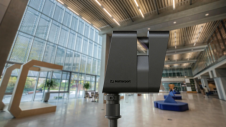Advanced Navigation Acquires Vai Photonics
Advanced Navigation has acquired Vai Photonics, a spin-out from the Australian National University (ANU) developing patented photonic sensors for precision navigation. Advanced Navigation is one of the world’s most ambitious innovators in artificial intelligence (AI) robotics and navigation technology.
Vai Photonics and Advanced Navigation share a similar vision to provide technology to drive the autonomy revolution. Together, they will commercialize their research into exciting autonomous and robotic applications across land, air, sea and space.
Autonomy Revolution
“The technology Vai Photonics is developing will be of huge importance to the emerging autonomy revolution. The synergies, shared vision and collaborative potential we see between Vai Photonics and Advanced Navigation will enable us to be at the absolute forefront of robotic and autonomy-driven technologies,” said Xavier Orr, CEO and co-founder of Advanced Navigation. “Photonic technology will be critical to the overall success, safety and reliability of these new systems. We look forward to sharing the next generation of autonomous navigation and robotic solutions with the global community.”
High-precision Positioning of Moving Vehicles
James Spollard, CTO and co-founder of Vai Photonics, detailed the benefits of the emerging technology. “Precision navigation when GPS is unavailable or unreliable is a major challenge in the development of autonomous systems,” he stated. “Our emerging photonic sensing technology will enable positioning and navigation that is orders of magnitude more stable and precise than existing solutions in these environments.”
“By combining laser interferometry and electro-optics with advanced signal processing algorithms and real-time software, we can measure how fast a vehicle is moving in three dimensions. As a result, we can accurately measure how the vehicle is moving through the environment, and from this infer where the vehicle is located with great precision,” continued Spollard.

Flying Taxis
The technology, which has been in development for over 15 years at ANU, will solve complex autonomy challenges across aerospace, automotive, weather and space exploration as well as railways and logistics. Aircraft with an electric vertical takeoff and landing system such as flying taxis will greatly benefit from this technology, for example. Takeoff and landing are often considered the most dangerous and expensive parts of a flight route. Vai Photonics sensors will provide safe and reliable autonomous takeoff and landing under all conditions. Meanwhile, space travel and exploration is fraught with risks, vast complexity and enormous cost. This technology will bring massive benefits to space missions, helping to cement Advanced Navigation as the gold standard for space-qualified navigation systems for space exploration.
Pushing the Boundaries to Power Lives
Professor Brian Schmidt, vice-chancellor of the Australian National University (ANU), said: “Vai Photonics is another great ANU example of how you take fundamental research – the type of thinking that pushes the boundaries of what we know – and turn it into products and technologies that power our lives. The work that underpins Vai Photonics’ advanced autonomous navigation systems stems from the search for elusive gravitational waves – ripples in space and time caused by massive cosmic events like black holes colliding.”
“The team have built on a decade of research and development across advanced and ultra-precise laser measurements, digital signals and quantum optics to build their innovative navigation technology. We are proud to have backed Vai Photonics through our Centre for Gravitational Astrophysics and business and commercialization office. It’s really exciting to see the team take another major step in their incredible journey,” he added.

Navigating the Future
Dr Lyle Roberts, CEO and co-founder of Vai Photonics, is looking forward to an autonomous future: “This is a huge win for the Vai Photonics team. Together with Advanced Navigation, we are able to bring our product to market much faster than originally planned. We now have access to leading research and development facilities along with strong distribution channels. We couldn’t have asked for a better outcome and look forward to navigating the future with Advanced Navigation.”
This acquisition fits into Advanced Navigation’s larger growth strategy to expand its product and solutions portfolio across deep technology fields that look to solve the world’s greatest challenges facing the autonomy revolution. The acquisition was finalized in April 2022, subject to typical closing conditions. The Vai Photonics team has been integrated into Advanced Navigation’s research and development team, based out of the new Canberra research facility.
Previous to this, Spollard and Roberts received seed funding from the Research School of Physics Technology Development Fund, the ANU Connect Ventures Discovery Translation Fund, OzGrav, the ARC Centre of Excellence for Gravitational Wave Discovery and EQUS, the ARC Centre of Excellence for Engineered Quantum Systems towards fundamental Lidar research that came to be Vai Photonics.

Value staying current with geomatics?
Stay on the map with our expertly curated newsletters.
We provide educational insights, industry updates, and inspiring stories to help you learn, grow, and reach your full potential in your field. Don't miss out - subscribe today and ensure you're always informed, educated, and inspired.
Choose your newsletter(s)












